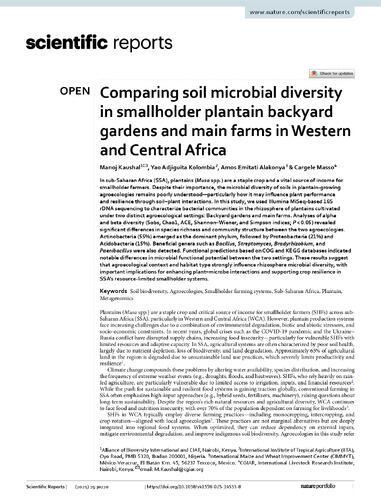
In sub-Saharan Africa (SSA), plantains (Musa spp.) are a staple crop and a vital source of income for smallholder farmers. Despite their importance, the microbial diversity of soils in plantain-growing agroecologies remains poorly understood-particularly how it may influence plant performance and resilience through soil-plant interactions. In this study, we used Illumina MiSeq-based 16S rDNA sequencing to characterize bacterial communities in the rhizosphere of plantains cultivated under two distinct agroecological settings: Backyard gardens and main farms. Analyses of alpha and beta diversity (Sobs, Chao1, ACE, Shannon-Wiener, and Simpson indices; P < 0.05) revealed significant differences in species richness and community structure between the two agroecologies. Actinobacteria (55%) emerged as the dominant phylum, followed by Proteobacteria (21%) and Acidobacteria (15%). Beneficial genera such as Bacillus, Streptomyces, Bradyrhizobium, and Paenibacillus were also detected. Functional predictions based on COG and KEGG databases indicated notable differences in microbial functional potential between the two settings. These results suggest that agroecological context and habitat type strongly influence rhizosphere microbial diversity, with important implications for enhancing plant-microbe interactions and supporting crop resilience in SSA's resource-limited smallholder systems.

